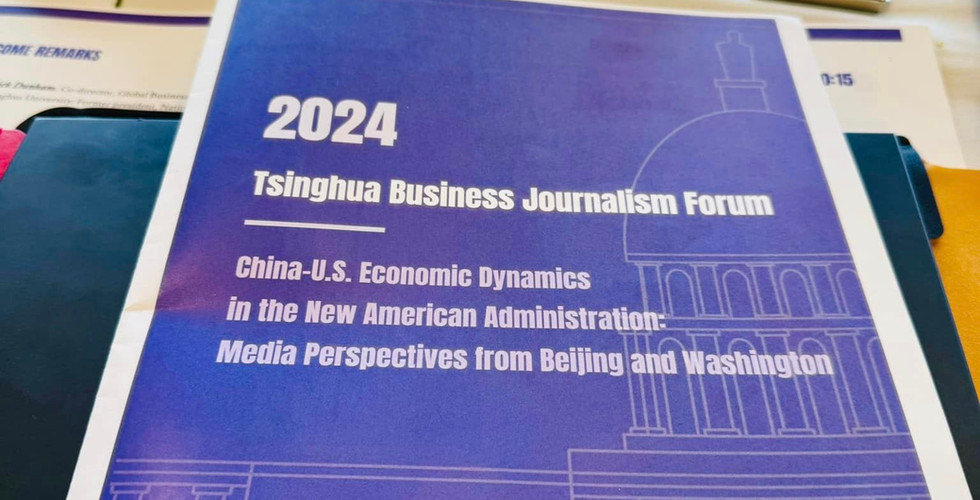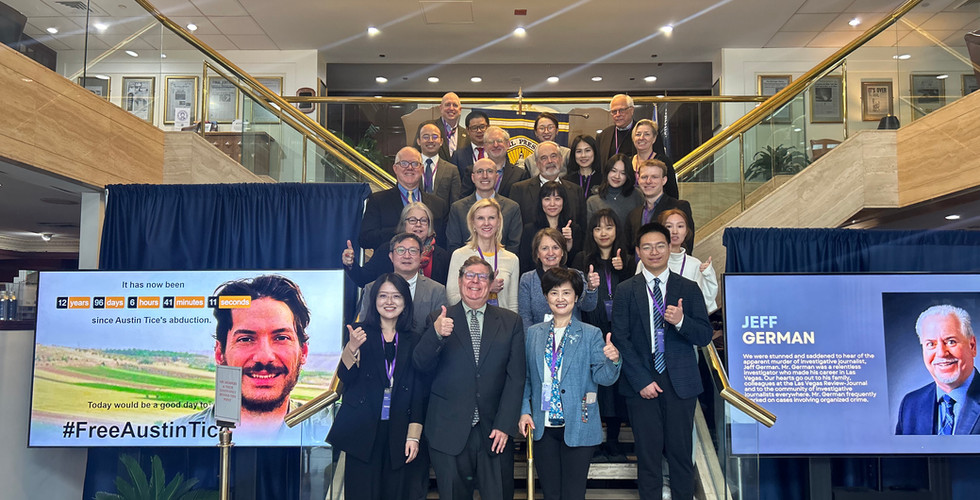October-November Newsletter: Business Journalism Forum held in Washington, GBJ leaders visit USC, Berkeley, students visit companies in Beijing
- Rick Dunham
- Dec 11, 2024
- 8 min read
Updated: Dec 12, 2024

GLOBAL BUSINESS JOURNALISM NEWSLETTER
October-November 2024
GBJ makes history with first Business Journalism Forum held outside of Beijing; global partnerships deepen; students experience China and hear from diverse international experts

The fall semester has been a whirlwind of activity, on campus and off.
On campus, the Global Business Journalism program and the Tsinghua School of Journalism and Communication have hosted numerous high-level speakers and programs, ranging from a White House correspondent and a former president of the Asian Development Bank to a program created in partnership with the International Committee of the Red Cross.
Off campus, our students have visited media outlets such as Bloomberg News and People's Daily, companies such as Huawei and Microsoft.
GBJ's leaders, along with TSJC Dean Zhou Qing'an and Professor Kuang Kai, have deepened the journalism school's international partnerships and global recruiting efforts with trips to Singapore and the United States. For more about these efforts, read on ...
Check out this slide show featuring photos from the Tsinghua Business Journalism Forum
The Tsinghua Business Journalism Forum goes global
For the first time in its 17-year history, the Tsinghua Business Journalism Forum was held outside of Beijing. On November 15, the Global Business Journalism program co-sponsored the high-level international forum – our most important annual event – at the National Press Club in Washington.
The forum was held at the most famous journalism venue in the American capital a day after GBJ leaders attended the 40th anniversary gala of the International Center for Journalists, the founding partner of the GBJ program and the current managing partner.
More than 20 journalists, academics and business analysts from the United States, China and around the world discussed this year's topic: the impact of Donald Trump's impending return to the White House on China-United States economic relations. The roster included National Press Club president Emily Wilkins, CNBC's congressional correspondent and Global Business Journalism co-directors Rick Dunham and Hang Min.
Other program participants included:
Xianlai Deng, Washington Correspondent, Xinhua News Agency
Ching-Yi Chang, White House Correspondent, Shanghai Media Group
Leslie Wayne, Contributing writer, The New York Times; Business journalism professor, Columbia Journalism School
Scott Lanman, Managing Editor, Economic Data, Bloomberg News
Anand Naidoo, Anchor, CGTN America’s “The Heat,” CGTN’s Washington, D.C., Bureau
Yan Jin, Washington Bureau Chief, Caijing Magazine
Doug Harbrecht, Former President, National Press Club, Online News Editor, Business Week
Cary O'Reilly, longtime foreign correspondent and team leader, Bloomberg News
Mark Schoeff Jr., Financial Services and Financial Technology Reporter, CQ Roll Call
Kristiina Helenius, Washington-based business executive; Former Finnish journalist and diplomat; editorial contributor, POLITICO
Pam Tobey, former graphics editor, The Washington Post; former Visual Director, Beijing Review
Zichen Wang, Author, Pekingnology newsletter; Research fellow, Center for China and Globalization (CCG)
Ivy Yang, Founder, Wavelet Strategy; Columnist, FT Chinese; Writer, Calling the Shots newsletter
Jin Ding, Chief Executive Officer, Initium Media
Jane Sasseen, Executive Director, McGraw Center for Business Journalism, The City University of New York; Former Reporter and Editor, Business Week, and Forbes
Tao Lu, Director, American News Center, Phoenix Satellite Television
Eric Fish, Author; Freelance journalist, Foreign Policy, The Atlantic, The Diplomat, and The Telegraph
The three panels were moderated by Tsinghua Professor Kuang Kai, National Press Club Journalism Institute president Gilbert Klein, emeritus director of the University of Oklahoma's Washington journalism program, and Todd Gillman, director, of the Washington Bureau of the Walter Cronkite School of Journalism and Mass Communication at Arizona State University.
Tsinghua's journalism school dean, Zhou Qing'an, offered a welcome statement to the forum.
"Today, the global economic landscape is undergoing severe challenges and profound shifts," he declared. "On one hand, changes in the geopolitical environment and the spread of a few significant conflicts worldwide are placing immense pressure on global shipping, supply chains, and trade structures. On the other hand, the rise of unilateralism has led nations to closely scrutinize the impacts of such policies on their domestic economies and trade structures. In this context, the role of business journalism has become more crucial than ever."
After a day of comprehensive conversations, the group was in agreement that conflict is inevitable amid threats of tariffs and likely retaliation. Managing the coming period of uncertainty will be crucial for both governments and for companies in China and the United States alike. Explaining the situation factually – and fairly – will be a crucial challenge for journalists in both nations.
Dean Zhou Qing'an led the Tsinghua delegation to the University of Southern California and UC-Berkeley
2. Celebrating five years of partnership with USC ... and looking forward to the next five

The Global Business Journalism program will be teaching students headed for the University of Southern California for at least the next five years. On November 11, Tsinghua journalism school dean Zhou Qing'an signed a memorandum extending the dual degree master's program with USC for the next five years. Signing on behalf of USC were Annenberg Communication and Journalism School Dean Willow Bay and Viterbi Engineering School Dean Yannis Yortsos.
Dean Zhou was joined in California by GBJ co-directors Hang Min and Rick Dunham, plus Professor Kuang Kai and international administrator Li Chengzhang. The Tsinghua delegation met with their USC counterparts and toured Annenberg's state-of-the-art digital newsroom and self-operated pocket studio.
Dean Zhou led the group to the University of California at Berkeley for meetings on November 12 before leaving for an international conference in London.
3. Foreign correspondents discuss coverage in war zones in program organized in partnership with Red Cross
Tsinghua hosted a discussion featuring correspondents who had covered conflict zones around the world. (GBJ photos by Rick Dunham)
There are 120 conflict zones in the world today, up from 20 in 199, the head of communications for the International Committee of the Red Cross told a media forum at the Tsinghua journalism school on November 25. Patricia Rey, the Geneva-based ICRC official, warned that "civilians are paying the price for these conflicts" and both journalists and aid workers have been killed and injured while trying to work in the war zones.
Conflict-zone reporters said that journalists face a dual threat: hostile armed forces that frequently target media members for attacks and widespread disinformation that breeds hatred and threatens their safety.
"The war is not just on the ground. It is in the media," said Dawit Mesfin, deputy CEO of Fana Broadcasting Corporation in Ethiopia.
Xinwen Liang, a producer in the digital news center of China Media Group, who has covered conflicts in Syria, Afghanistan, Iraq and Iran, said that while journalists try not to take sides in armed conflicts, they are often seen as partisans of one side of the conflict because of their nationalities.
"It's very hard to be [a] neutral in a war zone," she said.
Mika Hentunen, Asia correspondent for YLE Finnish Media and a former war correspondent in the Balkans, concurred that reporters are "not as neutral as we used to be" when facing challenges such as closed borders and one side of a conflict targeting them.
Sohaib Jassim, an al Jazeera correspondent, noted that Gaza is "the most dangerous war zone" in the world and that journalists have been killed with "rampant impunity."
Summing up the session, Tsinghua Dean Zhou Qing'an said that with all the challenges existing in conflict areas, "don't be too critical of journalists in the war zone." But, he added, "don't trust all the information coming from the war zone, especially social media ... Don't take any [one] media as the only source in the war zone."
4. GBJers visit media companies across Beijing
GBJ video by Arina Lvova
The classroom is only the beginning of the education of GBJ students. October and November are the peak months for class field trips, and Tsinghua professors took their students to visit a diverse group of media companies this fall.
A sampling of this fall's class trips.
Among the mainstream media companies to host visits were Bloomberg News, in a visit arranged by GBJ Professor Lee Miller, a Bloomberg News editor-at-large. Professor Rick Dunham's Mutimedia Reporting class toured People's Daily and heard from a range of staff writers and editors. Professor Fan Hong took her Corporate Communications students to multinational corporations including tech giants Huawei and Microsoft, along with consulting powerhouse Edelman.
From artificial intelligence and self-driving autos to nation branding and data storytelling, our GBJ students heard from the experts and experienced the future – on site.

5. Artificial Intelligence expert discusses disparate reactions to AI in China, U.S., U.K., India with GBJers
Global Business Journalism students engaged in a rigorous discussion of the future of artificial intelligence with a leading global researcher on the subject during a recent visit to the Tsinghua campus.
Professor John Downey of Loughborough University in England shared his comparative study on how newspapers cover generative AI in the U.S., U.K., India and China.
While coverage in the other countries is a mix of positive and negative, Chinese media coverage is more monolithic, he said: ”It tends to focus on economic benefits and social benefits because of the increased efficiency of the state.”

Specifically, Professor Downey’s paper looks into the ”contested visions” of the impact of generative AI on society.
”It seems like the higher-ups are enthusiastic about AI capabilities, but people with economic struggles feel fear such as job displacement,” GBJ student Salisa Vajrabhaya of Thailand said.
GBJ student Jacky Ma noted the disparate reactions in the different countries.
”He mentioned an interesting finding about mapping utopian and dystopian narratives of generative AI,” Ma said. ”People in the U.K. and U.S. are more focused on unemployment and misinformation, but people in China and India focus more on the potential benefits for technology and economic growth.”
Even though sites such as ChatGPT are blocked in China, Professor Downey found that China sees innovation in AI as a strategic priority for enhancing national power. But he offers a stark warning to go along with the positive spin: ”We’re giving too much of ourselves to AI.
”I have concerns,” he added. ”I hope I’m wrong."
He admits to using AI in his research, and believes that autonomous AI will be yet another game-changer in the future.
”My overriding impression is one of concern," he concluded, "and to a certain extent fear.”

GBJ students meet with United Nations recruiters at job fair
GBJ students attended the 5th United Nations Job Fair in Beijing as 10 representatives from different U.N. agencies answered questions on how to land a job at the global body.
”It’s a life of sacrifice,” said Carlos Barragan, HR chief at the United Nations Environment Programme. ”There’s a lot of heart, mind and will.”
With 20 years of work experience with the U.N., he’s seen it all.
”It’s fun but it’s not an easy job,” he said. ”It’s dealing with some of the worst we have in humanity. You’re dealing with human pain.”
Sharing some concrete advice, the representatives listed several important traits for students looking to work for the U.N. in the future, such as communication skills, being a team player and having exceptional organizational and planning skills. Accountability, integrity and innovation awareness are others.
Apart from education, work experience and language skills are all factors that will boost your job application.
”You don’t have to tick all the boxes,” said Beatrice Selina Belga, a director’s assistant at the United Nations Institute for Training and Research.
But if you don’t tick all the boxes, she added, tailor your CV and cover letter with extra care when applying for an internship at the U.N. She encouraged the students to keep track of UNjobs.org on a daily basis, as internship applications are open all year.
7. Catch up on other headlines from GlobalBusinessJournalism.com
Here are some stories we've published on our website since our last newsletter about GBJ guest speakers and other topics, in case you've missed them:
Trump tariffs jeopardize global economy, former Asian Development Bank leader tells GBJ students
How rich is Elon Musk? We visualize it in this Global Business Journalism infographic.
Social media brand-building advice from trailblazer Tracee Evans: 10 tips to help you create a trusted brand with a consistent message
Thanks for reading the October-November GBJ newsletter. We'll be back soon with more news and views from a new staff of newsletter contributors. If you want to be the first to read each GBJ newsletter, subscribe here and receive an email notification when a new newsletter is published.





































































Commentaires